Recent Comments
Prev 490 491 492 493 494 495 496 497 498 499 500 501 502 503 504 505 Next
Comments 24851 to 24900:
-
Dave2042 at 10:13 AM on 1 July 2016After 6 years of working on climate at Harvard, I implore it to show the courage to divest
William. You are missing two points.
First, companies frequently raise additional capital, for example to expand their business. They do this either by issuing new shares (this is largely the reason you bother to list on an exchange), or issuing debt. The price of new debt or equity is significantly affected by the current share price. In the case of raising equity, it is almost entirely set by the share price; in the case of debt it is more complex, but the share price, which signals the overall value of the business is still a very fundamental driver. So a falling share price can completely undermine this process.
Secondly, senior executives typically get much or even most of their remuneration either in shares, or in a form linked to the share price. A falling share price is a disaster for them, and so share price is a huge driver of their behaviour.
-
Tom Curtis at 10:04 AM on 1 July 2016The inter-generational theft of Brexit and climate change
william @33, I would have thought that the older generation, having lived through the periods of dominance of Pol Pot, Francisco Franco, Fidel Castro, General Suharto, Mao Zedong, Augusto Pinochet etc, would know very well that the EU is not a dictatorship. They should probably recognize that government by a commission appointed by an indirectly group of indirectly elected officials, and subject to the veto of a directly elected parliament is arguably more democratic than the US (where the President is indirectly elected, and appoints his "cabinet" without possibility of veto by Congress). It is not greatly different from the process in Brittain itself where the Prime Minister is indirectly elected from among the membership of a directly elected body, and where his cabinet need not be elected officials themselves (they may be members of the House of Lords), but can be vetoed by a directly elected body. The EU, like the US, and Britain and Australia is imperfectly democratic, but democratic none-the-less.
I would also have hoped the older generation would have had the sense to realize that the concerns afflicting them are shared by US citizens, Australians, New Zealanders and (probably) Candadians and therefore that the problem does not lie in EU membership.
I guess they are about to learn that the hard way.
-
scaddenp at 08:31 AM on 1 July 2016The inter-generational theft of Brexit and climate change
That simply sounds like rhetoric to me. Which acts by an unelected officials in the EU do you blame for the current situation?
I might also ask did they destroy unionism? Did they lower the taxes? However, I am more interested in what you perceive to be the answer to first question.
"They want out of the dictatorship by a few non elected commissioners which is the EU and which America finds much more easy to control and influence than 28 individual democracies." That sounds like conspiracy theorist territory. What is the evidence that convinces you of this?
If Brexit results in real improvement for lower classes in Britain, then I will delighted - and extremely surprized. Worst protest vote ever in UK is my guess.
-
william5331 at 08:13 AM on 1 July 2016The inter-generational theft of Brexit and climate change
I reject this constant theme that the greedy older generation voted for Brexit while the virtuous younger generation wanted to stay. The older amongst us have experienced the decline of democracy and the rise of neoliberalism (read Laisse Faire) and globilization in which massive international corporation, primarily out of America can do what they want and devil take the rest of us. They want out of the dictatorship by a few non elected commissioners which is the EU and which America finds much more easy to control and influence than 28 individual democracies. The young are seduced by the baubles that come from being in the EU and don't have the experience or vision to realize what is happening in the world and its likely consequensis. We have only had some reasonable senblance of democracy in the western world since the new deal by FDR. Before that there was a knock down drag out fight to achieve some semblance of justice for all. We are now on the way down agian and the Brexit vote, as much as anything, was a vote against this slide back into a neofeudalism.
-
william5331 at 07:57 AM on 1 July 2016After 6 years of working on climate at Harvard, I implore it to show the courage to divest
I;m no economist as will be immediately apparent but I fail to see how divestment helps. Surly you divest by selling your shares to someone else. If you are a big share holder, this may push the price of your shares down and someone else, potentially gets a bargain. If you decide simply to burn your shares, then the rest of the shares outstanding go up in value. Money only goes to the company when they issue their shares. After that, they are bought and sold by third parties (and can be bought back by the company in some cases) so how does this effect the coal companies.
-
chriskoz at 07:36 AM on 1 July 2016After 6 years of working on climate at Harvard, I implore it to show the courage to divest
ubrew12@5,
I upvoted your post because you found the right time and the right context (this thread) to use Holocaust and all-upcasing (coment policy not withstanding in this case I hope mods agree). Thank you. Usually, those who resort to such arguments in their disussion, are losers. You're the winner. End of discussion in both cases.
I can only second that silence about AGW mitigation is still overwhelming as we speak. E.g. in AUS federal election, to be held tomorrow. Malcolm Turnball, the ruling party (NLP) leader who is given an edge to win by pundits, has not spoken at once about AGW during his campain, in fact during his entire prime ministership. Despite being an outspoken proponent of carbon price while he was an opposition leader.
The Greens are obviously vocal about AGW. So is the opposition party (ALP), but I wonder if they continue doing so if elected tomorrow. How could it be, that all people, once elected to govern, become universally silent? No matter where it be, in state gov or in universities?
-
Tom Curtis at 06:04 AM on 1 July 2016Venus doesn't have a runaway greenhouse effect
Mike Hillis @200, for what it is worth, 5.77 to 56.58 microns represents a band containing 95% of IR emissions at 288 K, with approximately symetrical quantities of excluded emissions in each tail, so it is probably closer to what you are looking for. The right tail (in your graph at 200) cuts of at a much lower point in the y-axis than does the left tail, but that is due to the truncated shape of the left tail curve requiring a lower instantanious radiative flux at the cut of to represent the same total radiative flux in the tail.
Regardless, for the purely technical point as to whether "the atmosphere is almost 100% transparent or largely transparent to a majority of upwelling wavelengths of IR", we only require a precise characterization as to what counts as an upwelling wavelength, and 6 to 30 microns is precise. It also represents a bandwidth of 24 microns compared to the 5 microns from 8-13 microns, that being the only band of IR radiation with >50% transmittance from surface to space within the 6-30 (or 5.77 to 56.58) micron band. Ergo for either definition, it is not true that "the atmosphere is almost 100% transparent or largely transparent to a majority of upwelling wavelengths of IR".
More substantially, nothing in this discussion has called into question Costa and Shine's estimate that the mean clear sky radiation from the surface to space is 66Wm^-2 and that the global mean all sky radiation from the surface to space is 20Wm^-2 (+/-20%), as discussed by MA Rodger @184. That is, only 28% of clear sky radiation to space directly from the surface, while only 8.5% averaged globally comes directly from the surface. The percentages are significantly smaller as a fraction of total surface emission.
-
John Hartz at 01:10 AM on 1 July 2016The inter-generational theft of Brexit and climate change
A humorous look at Brexit from across the pond…
A Bachelor Named Britain, Looking for Love, Op-ed by Frank Bruni, New York Times, June 29, 2016
-
denisaf at 21:46 PM on 30 June 2016Chatham House: Brexit could harm UK climate and energy policy
This discussion of 'energy' and 'climate change' is misleading as it is really dealing with systems made of irreplaceable materials supplying only electrical energy for the operation of some of the infrastructure. These systems cannot supply alternative forms of liquid fuels required by the fleets of ships and aircraft. And climate change is only one consequence of greenhouse gas emissions from fossil fuel usage. Ocean acidifcation and warming is another deleterious consequence
-
MA Rodger at 20:48 PM on 30 June 2016Venus doesn't have a runaway greenhouse effect
Mike Hillis @200.
Your chart is a very bad choice and your interpretaion of it is exceedingly poor. Indeed, you are giving a very good impression of somebody well out of his depth.
The contention you make @195 is "Upwelling radiation below 6 and above 30, for the purposes of a discussion about the Earth's greenhouse effect and the absorbtion of IR by its atmosphere, is trivial."
The AGW discussion about the Earth's greenhouse effect is greatly concerned with an effect that will hopefully remain well below 1% of global energy flows. I appreciate that you comments here @SkS strongly suggest you have problems with the concerns others have with AGW but this is SkS and the goal of SkS is to explain what peer reviewed science has to say about AGW. Thus I would suggest that if you want to talk of some part of the planet's energy balance being "trivial," you bear in mind where you are and frame your argument accordingly.
The chart you present @200 does not well characterise your contended position. Why the two limits 30 microns & 6 microns? They are even strongly asymetric on the chart you chose to present. I feel you are but struggling to defend your statement @181 "Earth doesn't even emit 4 microns" and @190/91 "As for the gish gallop of whether Earth radiates 4 microns:- it doesn't." This was ever a hiding-to-nothing for you. Even the graphic you present @191 to defend your indefensible position graphs the "upwelling" emissions down to 2.5 microns. You were wrong. Get over it.
You latest chart is a very strange choice. Its origins are as Figure 1 on this webpage. Note that the discussion there for which that Fig 1 is presented is all about solar radiation. It is not about the earth's surface radiation, the "upwelling" stuff withinin your contention and so it is entirely wrong to start waving its Fig 1 as being an authority on that "upwelling" radiation. Mind, that image has spread across the interweb and been used for various purposes, not all of which are well advised. The "upwelling" radiation profile in that graphic is no more than schematic. And obviously so. Note how the peak radation level is at 10 microns. You present this graphic as your authoritative evidence but you grossly misrepresent it. Indeed, I am puzzled as to why you feel the need to source your own graphical representation of the "upwelling" radiation when this comment thread is stacked high with such graphics.
-
sidd at 15:19 PM on 30 June 2016The inter-generational theft of Brexit and climate change
"Who will they blame when out of EU?"Precisely. They already blame their own government. And they have already forced a breakup of both Tory and Labour. Which is more than happened in a long while.
The Very Important People are speaking in a way that reminds me of the quote: "The people have spoken, the bastards."
-
scaddenp at 14:56 PM on 30 June 2016The inter-generational theft of Brexit and climate change
An example of the perception that societies evils can be blamed on EU even when exactly same thing is happening in countries that are not part of EU. Who will they blame when out of EU? Post war, the top tax rate was 92%. Both top and basic rates have dropped steadily since then. That part of equation is nothing to do with EU, nor was quashing the unions.
-
sidd at 14:38 PM on 30 June 2016The inter-generational theft of Brexit and climate change
Let me add, with the moderators's permission, an anecdote. I spoke to an older person, born in the fifties, lived thru postwar UK rationing, the down years, and the up years after North Sea petro and gas, and voted to join Common Market in 1975."We voted to join in '75 because we thought things would get better. We got screwed for forty years, and the rich got all the money. The kids haven't lived through that, they think if they go along they'll get rich. Well, I tell them that all they will get is another forty years of getting screwed. No more, I'm voting out."
-
Glenn Tamblyn at 14:18 PM on 30 June 2016Venus doesn't have a runaway greenhouse effect
Mike
Finally, contrast this run, again with the Cumulus cloud model looking down from 4 km with the clear sky 4 km lookdown graph above. The presence of the clouds wipes out all structure from below, absorbs everything including in the Atmospheric Window (N-band) and forces emissions across the spectrum to a lower value. The model sets the cloudtops at 2.7 km.
A lot of stuff happens below the height of Mauna Kea. And since the average altitude of all land is around 850 meters, biasing your thinking around what happens above 4000 metres is missing a hell of a lot of detail.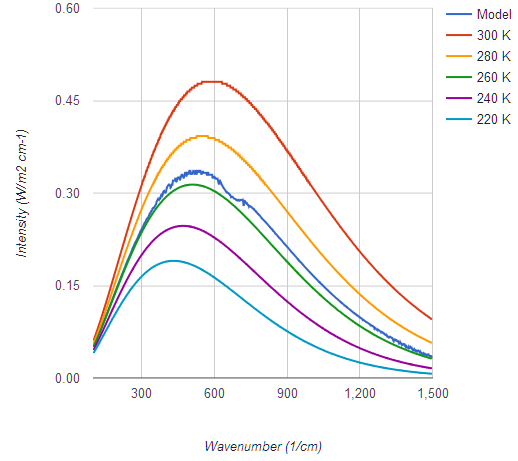
-
Glenn Tamblyn at 13:56 PM on 30 June 2016Venus doesn't have a runaway greenhouse effect
Summary.
Total decline in radiative flux between the surface and 70 km - (360.472 - 259.961) = 100.511 W/M2Around 48% of this occurs within the first 4 km, below the height of Mauna Kea!
Another 32% occurs from 4 to 8 km, only partly due to water vapour.
The remaining 30% occurs from 8 km up.
Then adding clouds adds a further 37 W/M2 of reduction.
And a note about how jagged the curve becomes as we ascend. We are seeing the declining impact of line broadening. At lower altitudes the individual absorption lines are smeared out over each other producing more even absorption/emission. At higher altitudes we start to see the individal spectral lines standing out more distinctly. -
Glenn Tamblyn at 13:44 PM on 30 June 2016Venus doesn't have a runaway greenhouse effect
Mike, your comment about Mauna Kea which is just over 4000 meters high.
Stop and consider what one would see if you were to look down from that altitude. Here are a series of emission spectra, calculated using Modtran with different lookdown altitudes starting at zero - the surface. All graphs are using US Standard Atmosphere, surface temperature of 288.2 K, clear sky, 400 ppm CO2, 1.7 ppm CH4, 40 ppb Tropospheric O3, standard values for atmospheric water and Stratospheric O3.As you go up in level you are seeing the impact of the levels below. When one part of the graph doesn't change between one level and the next, then the atmosphere has become transparent at that wavenumber. Also note the total upwards radiatave flux and how it declines with altitude.
This is the surface. Flux is 360.472 W/m2. It follows the Planck Curve for 288.2K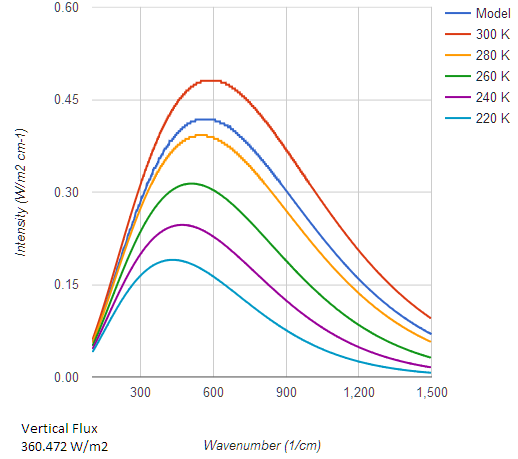
Next 1 km up, looking down. Flux has dropped to 351.994 Some small declines across the water bands, slightly larger effect from the CO2 band. Atmospheric window unchanged.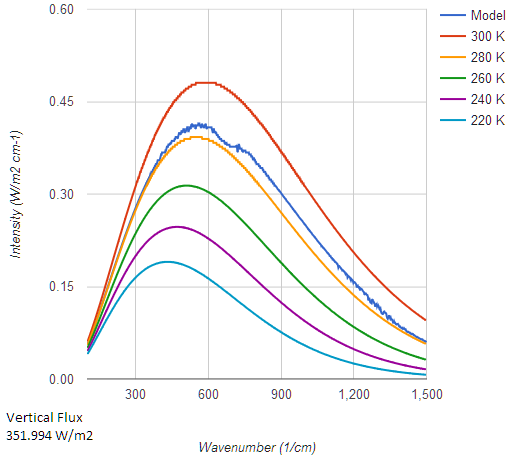
Next 2 km. Flux is now 337.55. More activity from water and CO2.

Next is 4km. Flux now 312.242 W/m2. The CO2 notch becoming more pronounced, Also the water regions are becoming more jagged. I will dscuss this later.
We have only just reched the altitude of Mauna Kea and activity from below has alreaady reduced the flux compared to the surface by around 48 W/m2. This much has happened before we even consider looking up.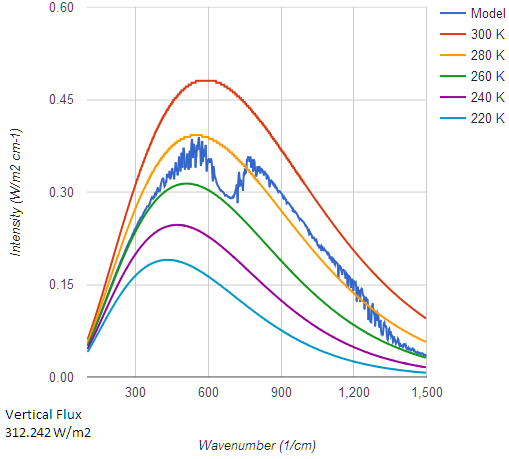
Next, 8km. Now in the upper troposphere. Flux is now 279.146. CO2 notch very prominent. Around 32 W/m2 decline in flux over the second 4 km contrasted with 48 W/M2 in the first 4 km. Reduced change from the water vapour regions nearere the CO2 regions, but still change below 450 and above 1350 cm-1.
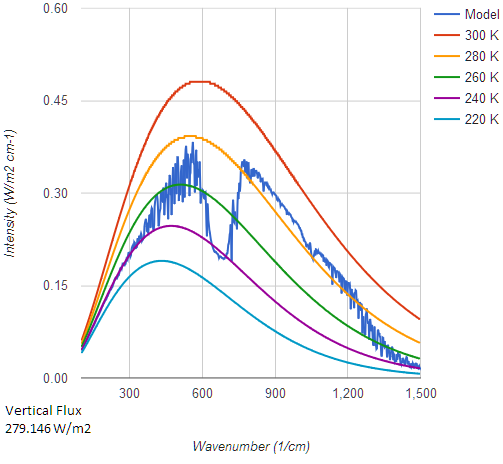
Next 16 km up. Now we are into the lower Stratosphere. Flux is now 261.782 W/M2. Only around 17.5 W/M2 change over the last 8 km vs around 71 W/M2 in the first 8 km. Essentially no change in any of the water bands above 450 cm-1. Water is only contributing more below 450 cm-1. where it is a stronger absorber. The atmosphere is now quite dry. CO2 is still contributing significantly and the Ozone notch due to statospheric Ozone has kicked in.
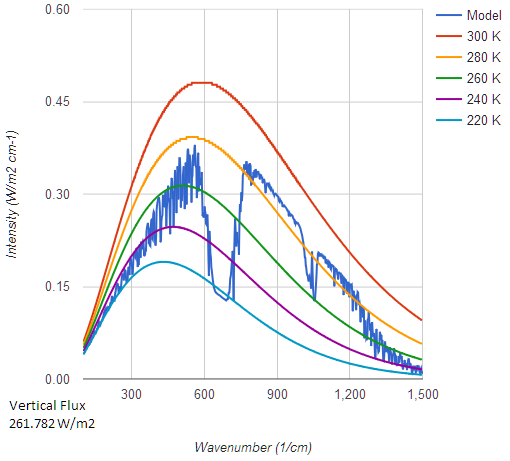
Next, 32 km looking down. Now in the upper Stratosphere where air temperatures are starting to rise. Flux is now 258.924. Only a small contribution now, mainly from Ozone. Notice the small spike visible at the bottom of the CO2 notch, and that the bottom of the notch is no longer below the 220 K Plamck curve but actuall is sitting on it. The CO2 band is actually radiating slightly more. This is originating from the warmer upper stratosphere.
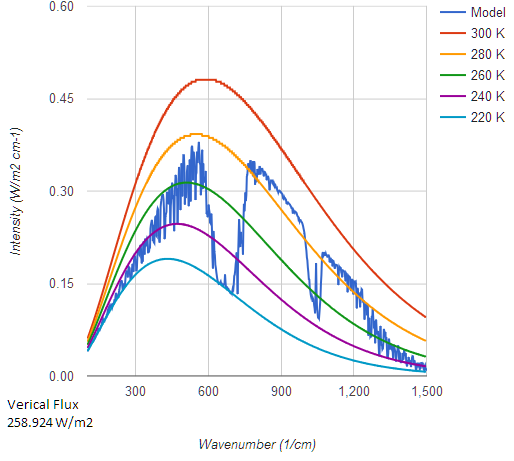
Next, 70 km looking down. Flux is now 259.961. Flux has actually increased slightly. Ozone hasn't contributed any more but the CO2 notch is now sitting a little above the 220K planck line and the central spike is higher. CO2 is adding slightly to emissions above the 32 km level.
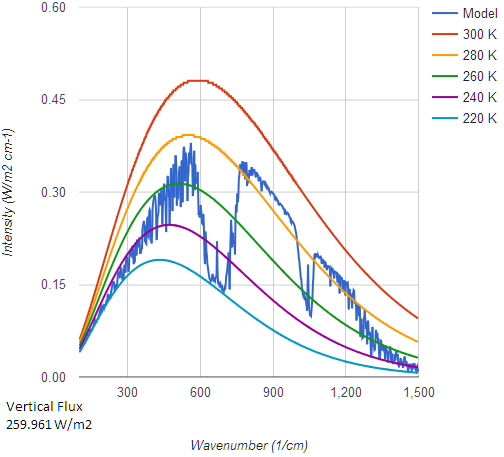
Finally, the same 70 km lookdown height, but with a cumulus cloud model added. Flux is now down to 222.909, 37 W/M2 lower! And we can see visibly reduced emissions across the water and atmospheric window regions from 450 to 1350 cm-1.

-
ubrew12 at 12:54 PM on 30 June 2016After 6 years of working on climate at Harvard, I implore it to show the courage to divest
The puzzling silence that greets the overwhelming 'now-ness' of climate action reminds me of how the World reacted to the Jewish Holocaust during WWII. We know. We KNOW, there is no way history will forgive us for our cowardice. We just can't seem to believe this heroism is demanded of us now, here in our present lives. The rude reality presses too harshly upon the well-constructed orderliness of our ordinary lives. The Great Barrier Reef may die, in some obscure corner of Earth's dark, mystifying ocean. But the Reef in our Disney-fied 'Dory-minds' lives on and on. It can no more be extinguished than can our Spirits; indeed, do not suggest otherwise with the intrusion of mere reality. I will sacrifice the World before I sacrifice my spiritual optimism.
-
Glenn Tamblyn at 12:49 PM on 30 June 2016Venus doesn't have a runaway greenhouse effect
Mike
15% outside 6-30 isn't trivial in my book. -
nigelj at 11:48 AM on 30 June 2016The inter-generational theft of Brexit and climate change
Scaddenp @27
I'm not saying a closed market helps wealth distribution. Read my comment at 20 above. Pulling out of the EU is unlikely to help with wealth redistribution and its a thing purely for British government policy. The EU dont control tax rates or wealth distribution.
I don't think totally free markets in labour have many gains for economic growth, and they certainly have down sides. Britain will probably actually have much the same immigration rates anyway, out of the EU, but may screen individuals a bit more. I go with reasonably free flowing immigration, but with some controls to knock off the rough edges. -
Mike Hillis at 11:22 AM on 30 June 2016Venus doesn't have a runaway greenhouse effect
Yes, below 6 um and above 30 are trivial:

Now back to Venus
-
scaddenp at 10:17 AM on 30 June 2016The inter-generational theft of Brexit and climate change
I repeat - how is going to a closed market supposed to help that problem with wealth distribution? I would expect the EU to give favourable access to manufactured products from Britain in return for same access to British market because it exports to UK far more than it imports (by factor of 3 I think). However, the UK labour market will be more expensive without free movement so I would expect competitiveness to decline. Dont expect any favours on the financial services market however where UK runs a healthy surplus. And, yes, I expect them to get ugly. After Farage's speech to EU, I dont think anyone in EU will be rushing to do any favours.
-
wili at 10:07 AM on 30 June 2016After 6 years of working on climate at Harvard, I implore it to show the courage to divest
"if our children look back to how we failed them, it will not have been for lack of scientific understanding or even technological prowess; it will have been due, fundamentally, to cowardice. A profound cowardice among those who actually do have a choice in this matter, a cowardice that confuses arrogance with intelligence, pettiness with importance, and, most fatally, comfort with necessity. "
Thank you. Very well put.
-
nigelj at 09:28 AM on 30 June 2016The inter-generational theft of Brexit and climate change
Scaddenp @ 24
It's hard to know what impact leaving the EU would have on gdp growth in Britain. During the 1960s there were big reductions in tariffs across many products, if you were part of the EU, so this probably helped growth to some extent.
Now its all quite different. Britain mostly exports manufactured products and services and tariffs on these are quite low even for countries outside the EU completely. There are high tariffs on basic commodities and farming, but Britain is not a big exporter of farming products, so leaving the EU may not have much impact on growth longer term. It will however hurt in the shorter to medium term due to all the uncertainty.
However the EU could decide to play "hardball" and place various new and specific restrictions just on British exports, and things could get ugly.
-
nigelj at 09:13 AM on 30 June 2016The inter-generational theft of Brexit and climate change
Scaddenp @ 23
I never mentioned job losses. As you say there are various reasons for this however its interesting to read recent IMF research. The prediction was that globalisation would displace manufacturing jobs in western countries and they would move to higher earning services jobs. The simple fact is this hasn't happened. The Economists got it wrong.
So I can only repeat since the era of free trade and globalisation since the 1980s, the benefits have tended to go to the top 10% in western societies and lower skilled people have got none of the wage increases, despite measurable productivity increases. This is maybe partly offset by cheaper imported televisions, but I suggest not much.
I agree free trade has helped the poor in developing countries, but its impoverishing the poor in western countries. Child poverty is increasing in Britain. Something has to be done.
Agree with the second part of your post that Britain is chopping off a leg to fix a sore toe. Britain have a tendency to superiority, and think they will be able to get all the trade benefits, and shut out immigration. Somehow I suspect the EU will drive a much harder bargain! You can't thumb your nose at the EU, and expect them to be all nice in return!
-
chriskoz at 09:07 AM on 30 June 2016After 6 years of working on climate at Harvard, I implore it to show the courage to divest
Thanks Ben for your action. I agree Harvard policy of forcing "silence" on the issue does not make sense. They should not, and even cannot in principle, be stripped of their ordinary citizen's rights to protest and express their opinions.
Even though scientists are supposed to avoid the expression of private opinions in their work, they are not robots but human beings that havwe compassion to others and feel responsible for their actions. Therefore they are entitled to take actions, especially if policies so absurdly contradict themselves. It's time to create necessary support for such movement in all universities. Like trade union movement in factories, that supports workers' rights, unis are lacking simillar support for their scxientists.
-
RedBaron at 08:44 AM on 30 June 2016Alpine soils storing up to a third less carbon as summers warm
You can be skeptical you want Chriskoz, but this study is on the wrong biome and a different carbon pathway. It's meaningless, as is your arguments as to why you are skeptical as well. You are talking about labile carbon, which has a very tiny relative impact on soil carbon anyway. The pathway that has potential to actually be used by agriculture to sequester carbon long term deep in the soil profile is called "the liquid carbon pathway" ie photosynthesis-root exudates-micorrhyzal fungi- glomalin-humic polimers which bind tightly to the soil mineral base and last thousands of years or more if undisturbed. This is a defining property of grassland biomes and is what created the deep rich high carbon mollisols of the world.
http://amazingcarbon.com/PDF/JONES-LiquidCarbonPathway(AFJ-July08).pdf
-
chriskoz at 08:34 AM on 30 June 2016Alpine soils storing up to a third less carbon as summers warm
william@1,
Techniques such as no till agriculture put carbon back into the soil and if widely adopted, would start to suck carbon from the atmosphere
Although it sounds good, Im ' skeptical that much carbon can be sequestered thay way. It will find its way back to atmosphere in very short time because the two reservoirs are tightly coupled and ever-present microbial action tends to re-ballance any diturbance you create. Think about a model of two pools connected by a shallow, large diameter pipe. How much work do you need to do restrict the equilibrating flow in the pipe while you're trying to move water from one pool to anoher? And if your restriction starts leaking? Your efforts are going to waste.
-
RedBaron at 08:33 AM on 30 June 2016Alpine soils storing up to a third less carbon as summers warm
It really bothers me when articles like this show up. Not that they are false. It is well known and has been for many decades that forests, especially in warmer climates, are poor sequesterers of carbon in soil, and the carbon on the forest floor is labile carbon, not stable carbon. The vast majority of stable soil carbon is in grassland/savanna biomes as the grasses are what sequester a far larger % of the products of photosynthesis deep in the soil profile. So once again this whole line of inquiry is flawed before it even began, because it is the wrong biome.
-
scaddenp at 07:54 AM on 30 June 2016The inter-generational theft of Brexit and climate change
"We just dont know" I fear that UK is about to find out.
-
scaddenp at 07:36 AM on 30 June 2016The inter-generational theft of Brexit and climate change
Nigel - what makes you think unfair trade will trickle down any better? While there is undoubtedly job losses to Asia, this is often blamed when there are much bigger job losses to automation.
The "ordinary" people are actually driving outsourcing to a very big degree as preferring cheap consumer goods from Asia instead of expensive local products. On the plus side, free trade does wonders for lifting standards of living across developing world.
I agree that voters are lashing out at EU but to my mind they are chopping off a leg to fix a sore toe. I see in paper today that EU have reinforced message that there is not going to be access to market without free labour movement. It appears Brexiteers are still living in the alternate reality where they think they can kick out immigrants and retain trade.
I am also in NZ - far from Brexit effects thankfully, but I think UK has similar income support systems.
-
nigelj at 07:33 AM on 30 June 2016The inter-generational theft of Brexit and climate change
Tom Curtis @ 13
What you say about "good" pragmatism needing a basis of idealism is all fair enough. Otherwise pragmatism may merely be forced compromise in the persuit of a hidden aggenda.
My point was more that the young are idealistic, a good thing, but sometimes a bit naive as well. Older people see economic problems differently as they have mortgages and families and life experience. I pass no judgement on the generations as both idealism and realism are good attributes, but the difference between young and old may explain the voting outcome.
-
HK at 07:31 AM on 30 June 2016Venus doesn't have a runaway greenhouse effect
This discussion has been mostly about Earth lately, so I thought it was time to return to our beautiful/hellish sister planet!
The chart below illustrates the point I made in @141 and in the last paragraph of @160:
If the extreme temperature on Venus was caused by any kind of additional energy source rather than the atmosphere slowing down the heat loss to space, the red curve based on measurements outside the atmosphere would have been much closer to the black one.
It’s hard to find a more crystal clear fingerprint of an extreme greenhouse effect in action than this!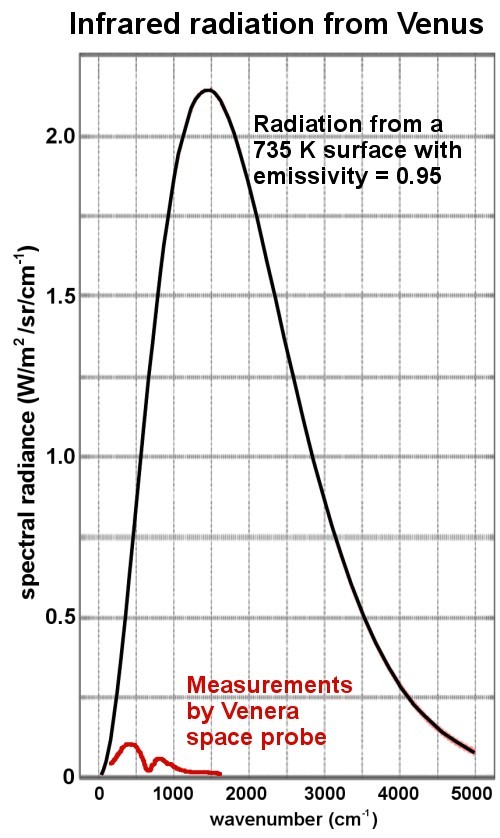
Source:
SpectralCalc.com and figure 3c here. -
nigelj at 07:24 AM on 30 June 2016The inter-generational theft of Brexit and climate change
Scaddenp @ 7
Your gdp graph of growth does show an upwards trend from about 1960 - 1990. I acknowledge some of this could be free trade with the EU, but much of it could be due to industrial policy in the 1960's and Thatchers reforms in the 1980's. We just dont know.
-
sailingfree at 07:24 AM on 30 June 2016After 6 years of working on climate at Harvard, I implore it to show the courage to divest
An irony here is that Oil stocks have lost half their value since that protest.
-
nigelj at 07:19 AM on 30 June 2016The inter-generational theft of Brexit and climate change
Scaddenp @15.
The benefits of free trade have definitely not trickled down very well to average people. The same goes for globalisation and outsourcing of labour to Asia by Western countries, where ordinary people have not really benefited much. For example wage levels over the last 25 years have been pretty static in western countries for the lower part of society, particularly in America. The Economist.com is a very reputable publication and has acknowledged this repeatedly.
I'm not for a second suggesting countries stop free trade or globalisation, or become insular, but some way has to be found to share the benefits of free trade more equitably. In my country of NZ we have tax funded income support policies that help to some extent.
But theres obviously at least a perception among working people in Britain that they are being "shafted"economically and they lashed out at the only thing they could, the EU. Its sad because leaving the EU may well not resolve the problem!
-
sidd at 07:18 AM on 30 June 2016The inter-generational theft of Brexit and climate change
Not so simple as intergenerational divide:http://www.theguardian.com/politics/commentisfree/2016/jun/24/divided-britain-brexit-money-class-inequality-westminster
"If you’ve got money, you vote in,” she said, with a bracing certainty. “If you haven’t got money, you vote out.”
and another along the same lines:
https://www.theguardian.com/commentisfree/2016/jun/27/liverpool-london-brexit-leave-eu-referendum
sidd
-
william5331 at 06:44 AM on 30 June 2016Alpine soils storing up to a third less carbon as summers warm
The fact that the soils of the world still contain 3 times as much carbon as the atmosphere, despite year of chemical agriculture which has sent soil carbon into the atmosphere at a rapid rate is a cause for hope. Techniques such as no till agriculture put carbon back into the soil and if widely adopted, would start to suck carbon from the atmosphere. You will be aware that the atmospheric carbon goes up 8ppm and down 6ppm each year indicating how powerful natural processes are. If we were truly to recruit this and other natural processes, I bet we could start to reduce atmospheric carbon at a surprisingly fast rate. (of course this must go along with a cessation of using fossil fuels). Other measures would include spreading beavers throughout all our catchments, ceasing to catch any whales, (see Monbiot's TED talk), increasing forest plantations, incorporating the wood into long lasting structures, burning the waste wood to the charcoal stage for energy and incorporating the charcoal into our soils and so forth. Nature would like to be our friend if we would just work with her. If not, she will reap us.
-
Glenn Tamblyn at 06:19 AM on 30 June 2016Venus doesn't have a runaway greenhouse effect
Mikw Hillis
From an earlier comment you made "The ozone band at 9.6 is not relevant because there is no O3 in the troposphere".
Not true. Ozone measured at Mauna Loa for example fluctuates around 40 ppb. Tropospheric ozone is formed via photochemical reactions with a number of largely man-made atmospheric pollutants. See here.
If I plug a figure of 40 ppb forTropospheric Ozone into the Modtran calculator at U Chicago, and contrast that with 0 ppb, using a US Standard Atmosphere, the difference is 0.565 W/m2. Not in the same league as the forcing from doubling CO2 of 3.7 W/m2 but still not trivial -15% -
Glenn Tamblyn at 05:42 AM on 30 June 2016Venus doesn't have a runaway greenhouse effect
Mike Hillis
IR Radiation outside 6-30 micron is still around 15% of total Radiance. Not that trivial. See here for the calculation.Total Radiance for a temperature of 288K, emissivity of 1 is 124.178 W/m2/sr
Band Radiance between 6 & 30 is 105.277 W/m2/sr
So outside that band is 18.9 W/m2/sr
-
Jim Eager at 02:57 AM on 30 June 2016After 6 years of working on climate at Harvard, I implore it to show the courage to divest
I tink it's kind of rude to not put the guest author's name at top of the article, don't you?
-
alea at 02:10 AM on 30 June 2016Trump and global warming: Americans are failing risk management
Nice article, but I think you need to be a bit careful with your risk management analogies, specifically the one about car seat belts. After seat belts were made compulsory in the UK there was a drop in driver KSI numbers, however there was an increase in pedestrian and cyclist KSI (KSI = killed or seriously injured). This is an example of the law of unintended consequences, drivers wearing seat belts felt an increased level of safety behind the wheel of a car, and as a result engaged in more risky driving (the consequences of which are externalised on vulnerable road users). This type of behaviour is commonly referred too as risk compensation.
-
MA Rodger at 01:36 AM on 30 June 2016Venus doesn't have a runaway greenhouse effect
Mike Hillis @195,
It will be most interesting to see some charts that demonstrate that "upwelling radiation below 6 and above 30, for the purposes of a discussion about the Earth's greenhouse effect and the absorbtion of IR by its atmosphere, is trivial," especially given that chart you linked to @173 (in this thread about Venus) that also shows the "trivial" effect of doubling trace gas CO2.
-
Tom Curtis at 00:22 AM on 30 June 2016The inter-generational theft of Brexit and climate change
Haze @16:
"Social media is passing round a stat that only 36 per cent of 18-24 year olds voted. Given that this age group was the most likely to vote Remain, this would imply that if turnout had matched that of higher age groups, Remain coudld have triumphed.
However, it's not quite as simple as that - this is not real turnout data, and we will in fact never know exactly what proportion of each age group voted. Some quick background: at General Elections, representatives from political parties stand outside polling stations asking for your voting ID number, and collate this information country-wide to figure out who voted (and guess how, based on canvassing data). However, they tend not to at one-off votes, such as referendums, and didn't on Thursday."
(My emphasis, source)
So, the "facts" about youth turnout are in fact a statistical inference, and probably with a significant margin of error.
That being said, young voters turnouted in much lower numbers than old voters. It does not follow from that that '"The young" now complaining that "the old" are ruining their future couldn't be bothered to vote'. More probably, the majority of the young voters who are now complaining felt strongly enough about the issue to be among the young that voted. Those young have just cause to complain against their fellow young who did not vote, as well as against the elderly who, though unlikely to experience the long term impact, voted against the wishes of those who will.
-
Mike Hillis at 00:21 AM on 30 June 2016Venus doesn't have a runaway greenhouse effect
Upwelling radiation below 6 and above 30, for the purposes of a discussion about the Earth's greenhouse effect and the absorbtion of IR by its atmosphere, is trivial.
Also, the technologically defined end of the IR spectrum is around 350 um because waves around that length act less like photons and more and more like waves, according to Ian Glass p 27 of "Handbook of Infrared Astronomy"
"350 um is the wavelength where radio technologies such as superheterodyne receivers tend to be used rather than the optical-style infrared approach, and the radiation starts to be thought of as waves rather than photons"
I admit to thinking as an IR astronomer because most of my work in the field has been at Mauna Kea, which is high above much of Earth's water vapor, so I automatically didn't consider the difference when talking about the Q-band (17 - 24 micron) absorbing properties of the atmopshere at sea level, where much of the transmittance is brought down to a 20 or 40 %, while it remains a roughly flat 50% transmittance at Mauna Kea up to about 28. I will scan some charts now for the next post.
For all intents and purposes, transmittance in the N band on Mauna Kea is 100% or darn close to it. The reason we moved, first to Antarctica and then to Hubble, is due to the need to see things in the opaque bands, not because of any improvement in seeing in the N band, or even the Q band, really.
-
chriskoz at 00:10 AM on 30 June 2016The inter-generational theft of Brexit and climate change
Haze@16,
The FT "facts" you're refering to are behind paywall; maybe you should refer to another, more accessible source.
But what you're quoting, supports one of the OP premisses that Brexit campain was based on distorted facts or political myths propagated by Farage/Johnson. Those with degrees/prof jobs were able to see through the lies disseminated and opposed them. Those without were not able to judge the lies as such. They fell victims of the misinformation campaign. Only now they do realise their mistake, hence we have"bregret" now.
The similarities between brexit instigators' campaign and FF interest misinformation campaign about climate science is so obvious that such correlation cannot be ignored.
Also, the generation gap between leave/remain voters cannot be ignored. Despite other commenters arguing that the gap is not really there because most yonger voters did not care, those who did care should be treated as a statistical sample of a general population trend. And again, the similarities to intergenerational ethics of climate change is very obvious.
That des not mean those who voted "leave" are climate science deniers. Such claim would be wrong, OP does not make such a claim. It can only be noted that strong correlation suggests similar mechanisms may be at play. In case of brexit, it can be called "denial of political reality".
I don't find the OP analysis biased. Those who do, likely do not understand what bias is.
-
michael sweet at 23:55 PM on 29 June 2016Climate's changed before
Doodad,
Pesticides are invariably a tempory fix that have numerous bad side effect. I am old enough to remember when doctors gave children penicillin for sore throats and the sore throat went away immediately. Now penicillin no longer works against most sore throats and stronger drugs are required. Resistance to Roudup is already (after less than 20 years of widespread use) causing problems in farms using large amounts of herbicides. There are only a limited amount of pesticides available, after resistance develops to all of them they will no longer work. After less than 60 years of widespread use resistance to all antibacterials has developed. In another 60 years these drugs will be even less effective. Claiming that new pesticides will be developed to solve our AGW caused problems is simply false.
-
Haze at 19:28 PM on 29 June 2016The inter-generational theft of Brexit and climate change
I live in Australia and am currently on holiday in UK/Europe and am following Brexit avidly
Some facts "The young" now complaining that "the old" are ruining their future couldn't be bothered to vote. 64% of those eligible to vote didn't so essentially 2 in 3 of "the young" were not interested. In contrast 74% of "the old" or 3 out of 4 did vote.
The strongest association between voting Remain rather than Leave was possession of a degree followed by having a "professional" job. These associations were less marked in Scotland. The strongest association between voting Leave rather than Remain was not having a passport.
There is a petition currently with more than 4 million signatures calling for a second referendum. Hopefully the UK will not leave, it doesn't have to if Article 50 is not invoked, but I think that is not very likely.
-
scaddenp at 14:46 PM on 29 June 2016The inter-generational theft of Brexit and climate change
"The economic elite do best out of free trade and are somwhat isolated from negative impacts of immigration in rough neighbourhoods."
This is undoubtedly your perception, and definitely a perception supporting Trump is US, but I think reality is rather more complicated (eg changes in productivity, job profiles etc). If you are going to cut yourself off from your major market, I sure cant see how that is going to help poorer neighbourhoods. Do you seriously expect unemployment to go down after exit???
-
Tom Curtis at 13:45 PM on 29 June 2016Climate's changed before
Doodad @529, the global ecology may well take a hit from global warming, but it is likely to take bigger hits from over fishing, over logging, over population and free trade (with the consequent invading species). Regardless of all of these, it will survive in one form or another, and likely fully recover within 5 million years (ie, approx 0.1% of the age of the Earth).
Humans, on the other hands are not so lucky. We are likely to take major hits from global warming, and the direct impact on warm blooded animals of high body mass will hit us very hard, as will the impacts of disease and on our crops of the flourishing of small creatures and cold blooded creatures. Warm animals of high body mass make up an unusually large proportion of our non plant food sources (with the exception of fish, nearly all of it), and provide us significant services besides. Small warm blooded creatures and cold blooded creatures make up an unusually large portion of our disease vectors and predators on our crops. The distinction is not particularly important ecologically, but for us it is vital.
-
Tom Curtis at 13:36 PM on 29 June 2016The inter-generational theft of Brexit and climate change
nigelj @12, when you have what was essentially a 50/50 vote, it is false to claim that "the public ... were not seeing progress". Clearly 50% of the public were seeing enough "progress" (towards what exactly) to be relatively content with the situation. So, being accurate, some sections of the public found the presence of a significant minority of the people their nation colonized and exploited for hundreds of years making a life in Britain. Some other sections of the public were confused by what was meant by the terms "sovereignty" and "democracy" such that they described belonging voluntarilly to a treaty organization as a loss of sovereignty (so much so that they could regain their "independence"), or the presence of a committee of elected officials as making the EU "undemocratic" (while apparently the House of Lords does not make Brittain "undemocratic").
Prev 490 491 492 493 494 495 496 497 498 499 500 501 502 503 504 505 Next































 Arguments
Arguments



























